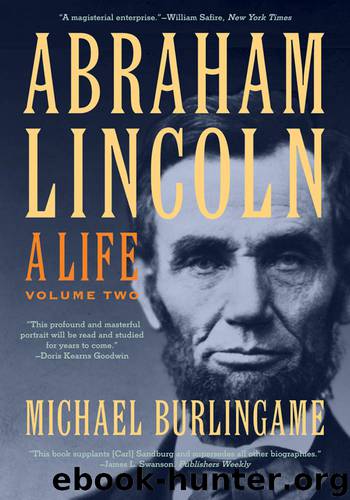Abraham Lincoln: A Life, Volume 2 by Michael Burlingame

Author:Michael Burlingame
Language: eng
Format: epub
Publisher: Johns Hopkins University Press
Published: 2008-03-24T16:00:00+00:00
31
“The Signs Look Better”
Victory at the Polls and in the Field
(July–November 1863)
Lincoln’s popularity soared after the victories at Gettysburg, Vicksburg, and Port Hudson. His old friend from Illinois, Jesse W. Fell, reflected the changed public mood when he told Lyman Trumbull that during the early stages of the war, “I did not like some things that were done, and many things that were not done, by the present Administration.” Along with most “earnest, loyal men, I too was a grumbler, because, as we thought, the Gov’t. moved too slow.” But looking back, Fell acknowledged that “we are not now disposed to be sensorious to the ‘powers that be,’ even among ourselves.” To the contrary, “it is now pretty generally conceded, that, all things considered, Mr. Lincoln’s Administration has done well.” The president had been tried, and it was clear “that he is both honest and patriotic; that if he don’t go forward as fast as some of us like, he never goes backwards.”1 To a friend in Europe, George D. Morgan, brother of New York Senator Edwin D. Morgan, explained that the president “is very popular and good men of all sides seem to regard him as the man for the place, for they see what one cannot see abroad, how difficult the position he has to fill, to keep the border States quiet, to keep peace with the different generals, and give any satisfaction to the radicals.”2 One of those Radicals, Franklin B. Sanborn (who had helped fund John Brown), declared that Lincoln “is really all that we desire.”3
Despite the Union’s July victories, the Confederacy was not on the verge of collapse. White House secretary William O. Stoddard accurately predicted that “[t]his tiger is wounded undo death, but it will die hard, and fight to the last.” If “we slacken our efforts because of our successes, there is great danger that the hard-won fruit of them will be torn from us.”4 Lincoln fully realized the truth of this prophecy and worked hard to keep his generals from slackening their efforts. Simultaneously, he girded for the looming political struggle in the fall, when crucial elections in Pennsylvania and Ohio would measure the public mood.
As the president did so, another White House secretary, John Hay, analyzed Lincoln’s leadership qualities. In the summer of 1863, Hay told his coadjutor, John G. Nicolay, that their boss “is in fine whack. I have rarely seen him more serene & busy. He is managing this war, the draft, foreign relations, and planning a reconstruction of the Union, all at once. … I am growing more and more firmly convinced that the good of the country absolutely demands that he should be kept where he is till this thing is over. There is no man in the country, so wise, so gentle and so firm. I believe the hand of God placed him where he is.” Hay scoffed at rumors that Radicals dominated administration policy: “You may talk as you please of the Abolition Cabal directing
Download
This site does not store any files on its server. We only index and link to content provided by other sites. Please contact the content providers to delete copyright contents if any and email us, we'll remove relevant links or contents immediately.
| American Revolution | Civil War |
| US Presidents |
Fanny Burney by Claire Harman(26603)
Empire of the Sikhs by Patwant Singh(23086)
Out of India by Michael Foss(16853)
Leonardo da Vinci by Walter Isaacson(13336)
Small Great Things by Jodi Picoult(7142)
The Six Wives Of Henry VIII (WOMEN IN HISTORY) by Fraser Antonia(5515)
The Wind in My Hair by Masih Alinejad(5095)
A Higher Loyalty: Truth, Lies, and Leadership by James Comey(4964)
The Crown by Robert Lacey(4817)
The Lonely City by Olivia Laing(4802)
Millionaire: The Philanderer, Gambler, and Duelist Who Invented Modern Finance by Janet Gleeson(4478)
The Iron Duke by The Iron Duke(4356)
Papillon (English) by Henri Charrière(4274)
Sticky Fingers by Joe Hagan(4198)
Joan of Arc by Mary Gordon(4110)
Alive: The Story of the Andes Survivors by Piers Paul Read(4032)
Stalin by Stephen Kotkin(3965)
Aleister Crowley: The Biography by Tobias Churton(3640)
Ants Among Elephants by Sujatha Gidla(3467)
